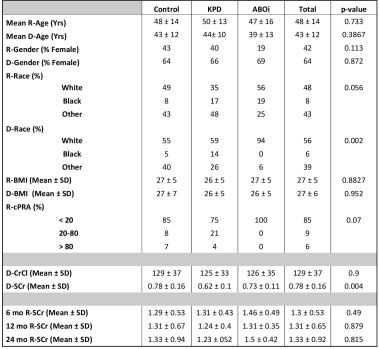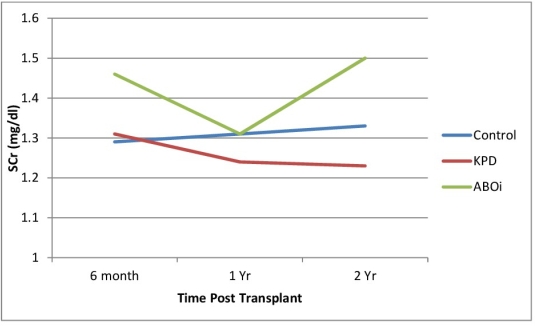Comparison of Renal Outcomes Between ABO-Incompatible and Kidney Paired Donation Transplantation In Living Donors.
Kidney Transplant Unit, UCSF, San Francisco, CA.
Meeting: 2016 American Transplant Congress
Abstract number: A125
Keywords: Donation, Kidney transplantation, Renal function
Session Information
Session Name: Poster Session A: Kidney Donor Outcomes
Session Type: Poster Session
Date: Saturday, June 11, 2016
Session Time: 5:30pm-7:30pm
 Presentation Time: 5:30pm-7:30pm
Presentation Time: 5:30pm-7:30pm
Location: Halls C&D
Introduction: ABO incompatible transplantation (ABOi Tx) broadens the donor pool and decreases wait times for patients who don't have a blood type compatible living kidney donor (LKD). ABOi Tx has demonstrated favorable outcomes as reported by the Japanese. Kidney Paired Donation (KPD) is an alternative, but carries limitations including variable wait times for certain blood types and the need to ship organs for wider access. We conducted this study to determine the renal outcome for ABOi Tx and KPD. METHODS: This is a single-center retrospective study of living donor transplants from 2005 to 2014. The purpose of this study was to compare the renal function of standard ABO/HLA compatible renal transplants (control group) with those transplanted under the KPD and ABOi Tx programs. Recipient serum creatinine (SCr) at 6, 12 and 24 months post-transplant were measured. Baseline living donors' renal function was evaluated using 24-hr urine creatinine clearance and SCr. RESULTS: Baseline demographics are demonstrated in figure 1.  All three groups had similar mean age, racial distribution and body mass index at the time of transplant. LKDs were older than recipients overall and there were twice as many whites donating to the ABOi Tx group (94% vs. 59% vs. 55%). In univariate regression analysis, SCr at all-time points were similar amongst the groups {p=0.812, C.I. (-0.18, 0.23)}
All three groups had similar mean age, racial distribution and body mass index at the time of transplant. LKDs were older than recipients overall and there were twice as many whites donating to the ABOi Tx group (94% vs. 59% vs. 55%). In univariate regression analysis, SCr at all-time points were similar amongst the groups {p=0.812, C.I. (-0.18, 0.23)}  . This was confirmed by the multivariate model correcting for donor SCr at Tx, race and recipient cPRA. CONCLUSION: ABOi-Tx does not exert a negative impact on kidney allograft function and appears to be an acceptable and safe option especially in pairs predicted to be difficult to match through the KPD or are burdened with long wait times. These results may better inform patient choices when considering LKD transplants with an ABO incompatible donor.
. This was confirmed by the multivariate model correcting for donor SCr at Tx, race and recipient cPRA. CONCLUSION: ABOi-Tx does not exert a negative impact on kidney allograft function and appears to be an acceptable and safe option especially in pairs predicted to be difficult to match through the KPD or are burdened with long wait times. These results may better inform patient choices when considering LKD transplants with an ABO incompatible donor.
CITATION INFORMATION: Hashemi N, Tavakol M, Lee B. Comparison of Renal Outcomes Between ABO-Incompatible and Kidney Paired Donation Transplantation In Living Donors. Am J Transplant. 2016;16 (suppl 3).
To cite this abstract in AMA style:
Hashemi N, Tavakol M, Lee B. Comparison of Renal Outcomes Between ABO-Incompatible and Kidney Paired Donation Transplantation In Living Donors. [abstract]. Am J Transplant. 2016; 16 (suppl 3). https://atcmeetingabstracts.com/abstract/comparison-of-renal-outcomes-between-abo-incompatible-and-kidney-paired-donation-transplantation-in-living-donors/. Accessed February 23, 2026.« Back to 2016 American Transplant Congress
